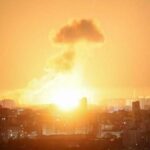Calls for Hamas to leave Gaza are growing louder as rare, open defiance sweeps through the war-ravaged territory. In videos circulating on Telegram, voices chant in unison: “Out! Out! Out!” and “All of Hamas, out!” — sentiments once too dangerous to express in public.
For nearly two decades, Hamas has ruled Gaza with an iron fist, violently suppressing dissent. But now, after more than a year of relentless Israeli bombardment and internal suffering, Gazans are speaking out more boldly against the group they blame for their misery.
Hamas is garbage, one crowd chanted while marching through devastated streets. Many Palestinians say the group has dragged Gaza into the worst crisis in more than 70 years, tying the population’s fate to endless conflict.
Moumen al-Natour, a Gaza-based lawyer and former political prisoner, is among the loudest voices criticizing Hamas. Speaking from a tent that now serves as his home, he accused the group of hijacking the territory and forcing its rule upon unwilling civilians.

We didn’t choose Hamas, al-Natour told the BBC. Now Hamas is determined to rule Gaza and tie our fate to its own. Hamas must retreat.
Despite the danger, al-Natour continues to speak out. In a recent Washington Post op-ed, he wrote: To support Hamas is to be for Palestinian death, not Palestinian freedom.He acknowledges the risks but insists, We need to take a risk and speak out.
The dangers are real. In late March, 22-year-old Oday al-Rubai was abducted from a refugee shelter and later found dead, his body showing signs of severe torture. Rights groups called his killing a grave violation. His family accused Hamas of carrying it out.
Before his death, al-Rubai posted a video expressing fear for his life, saying he was being hunted. “They destroyed us and brought ruin to us,” he said, standing alone on a dark street in Gaza City.
Other critics have suffered brutal retaliation. Last year, activist Amin Abed was beaten so badly by masked militants he had to leave Gaza for treatment abroad. Now in Dubai, he continues to support the protest movement and believes Hamas’ power is eroding.
According to Abed, Hamas is losing control. It targets activists and civilians, beats and kills them to scare people. But it’s not how it was before.
Beit Lahiya, in northern Gaza, has become a flashpoint of resistance. Locals have reportedly blocked Hamas militants from launching attacks from their homes. In one case, residents defended an elderly man’s house from being used as a rocket-launching site, even as gunmen opened fire.
They were not intimidated by the bullets,an eyewitness told the BBC. We don’t want your weapons that have brought us destruction, devastation and death.
Despite brutal repression, the protests suggest that many in Gaza no longer fear Hamas as they once did a sign that the group’s long-standing grip on power may be starting to slip.







